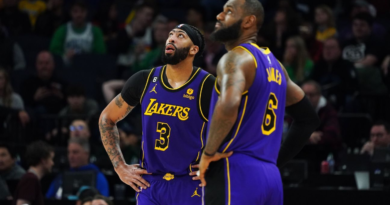U.S. loses to Lithuania, but quarterfinals up next
MANILA, Philippines — Team USA has taken a few losses over the decades in major international competition when roster flaws have been exposed, focus has been an issue and when an opponent puts together a brilliant performance.
Sometimes it’s the result of more than one of those factors, and that was the case Sunday night in the FIBA World Cup. Lithuania added to its illustrious history by scoring another win over the U.S., bullying and out-executing the Americans in a 110-104 victory.
Lithuania put together a sensational performance, blending its advantages and rising to the occasion. Some loose balls went its way and the officiating was puzzling at times, but it was a fair-and-square impressive showing.
Team USA had a 15-2 run in the third quarter and cut the lead to four points in the final minute, but it was always out of position and never appeared poised to overtake the Lithuanians.
Nine different Lithuania players made a 3-pointer, six had at least three rebounds, six had at least two assists and five scored in double figures.
Team USA was led by a valiant Anthony Edwards, who never relented and finished with 35 points, just three off Kevin Durant‘s Team USA scoring record. Mikal Bridges also played tirelessly and scored 14 points plus worked as hard as anyone on defense and in chasing loose balls.
But it just wasn’t good enough, as the U.S. was effectively outplayed for much of the game as its strategy and weaknesses were exploited.
“I hate losing, I probably won’t sleep much tonight,” Team USA coach Steve Kerr said. “But for us to get better, we needed to feel this, we needed to respond the way we did.”
There was an unexpected positive to come out of the night. Because of losses by the Dominican Republic, Brazil and Puerto Rico, the USA clinched a berth in the Paris Olympics. That might have been assumed but was far from assured as the loss was a reminder of the fragility in the international game.
The record shows that Mindaugas Kuzminskas (14 points), Vaidas Kariniauskas (15) and Jonas Valanciunas (12) led Lithuania in scoring, but credit for the win could go to the entire roster.
It isn’t the biggest win in Lithuania history — that remains the 1992 Olympic bronze medal victory over the Russian unified team — but it is on the short list, alongside its 2004 Olympic win over Team USA in Athens. And Lithuania did it with a terrific game plan that exploited the Americans’ lack of size and took advantage of an array of mistakes.
“It’s important for my country to win against USA,” Kariniauskas said. “It’s happened like 19 years ago when [Lithuanian legend Šarūnas Jasikevičius] was playing. I was watching that game 20-25 times maybe. So now we did it. So it’s crazy, but we have to chill.”
The immediate consequence of the loss for Team USA isn’t severe, as it had already secured its place in the medal round. Team USA will play Italy on Tuesday in the quarterfinals and is still a strong contender to win the title. The Americans may not see Lithuania again, and no team can give the USA size issues like Lithuania.
But it was a major blow to the team’s rhythm and confidence, which was previously unblemished.
The Americans know they’re small, and they have game plans and strategies for it. It is not so much a choice but a reality. The best big men in the world are generally from outside the U.S., and many of them are from Europe. That’s why there’s a potential recruitment for Joel Embiid, who became an American citizen last year, because it’s a real need.
But at the end of the day, if you’re small in basketball, you’re small. And the Lithuanians are — and have been for many years — quite big. They start three players 6-foot-9 and taller, and bring several more off the bench. Several of them are current and former NBA players.
The rebounding situation was bloody. Lithuania won the “battle” 43-27, and each one of its 18 offensive rebounds was another paper cut for the U.S.
Team USA starts one true big man, Jaren Jackson Jr., and he has a terrible fouling habit. True to form, Jackson had two fouls less than three minutes into the game. After not having a rebound in the win over Montenegro on Friday — a game that portended this one — Jackson didn’t get his first rebound Sunday until midway through the third quarter. It was the only one he got in the game, and he fouled out in the fourth quarter.
Despite the woeful rebounding, Jackson being on the court mattered, as the U.S. was plus-16 in the minutes he played and minus-22 when he was out.
“We need him on the floor — he’s one of our best players,” Kerr said of Jackson. “The early fouls changed the game for sure, and then you saw how effective he was when he was on the court. So he’s got to improve with that he knows that.”
There were team huddles and many different lineups deployed by Kerr using the team’s other big men, Bobby Portis and Walker Kessler. Kerr went with taller lineups with Brandon Ingram and Cameron Johnson. But Lithuania kept getting the ball off the rim, and sometimes even when the U.S. did get it, it seemed to require a herculean effort.
The antidote is supposed to be Team USA’s speed and its depth. And usually it is. It might even get the Americans a gold medal a week from now.
But in this case, the Lithuanians have just as much depth and more size. Kerr is committed to switching on pick-and-rolls and has defended that position with this roster. But Lithuania was unbothered and used that to create matchups it liked.
Also, Lithuania came into the game with seven different players averaging seven points or more. It doesn’t stress going to the bench.
All tournament the U.S. has had the advantage with its second unit, which might be the team’s backbone. Austin Reaves and Tyrese Haliburton haven’t been just two of the team’s best — they’ve been two of the tournament’s best. And they have done so because they’ve often operated against overmatched backups. But that wasn’t the case Sunday.
The Lithuanians came into the game leading the World Cup in team rebounding and 3-point shooting. That is a combo they shoved right in the Americans’ faces.
Lithuania made its first nine 3-point attempts and was coldly efficient in getting the shots — almost all of them were wide open. That was a result of the U.S. trying to throw some double-teams at the Lithuania bigs, which Lithuania expected as it flung it around to the open shooters.
When the U.S. didn’t double-team, the Lithuanians attacked size advantages in the post. In one memorable moment, Kariniauskas scored on Reaves in the post and drew a foul, and then stuck his tongue out at Reaves to the shock of the Filipino crowd, which adores Reaves.
“Nothing personal, just love of the game. I played with [Reaves’ brother, Spencer], so I talked to him before the game and he said ‘give [Austin] a trash talk,” Kariniauskas said. “So I give him some.”
But the rebounding was the real bedrock story. The Americans had survived getting pounded on the boards earlier in games against Germany and Montenegro. But neither was as damaging as what happened Sunday as Lithuania just broke them over and over by getting extra possessions.
“Luckily we get to play again,” Edwards said. “That’s all I’m thinking about.”




